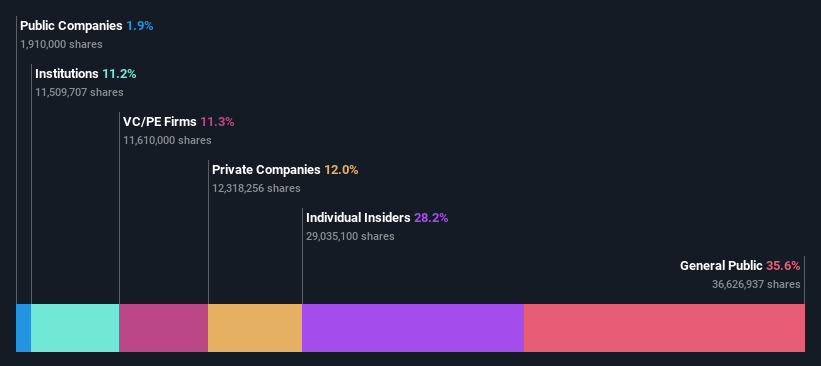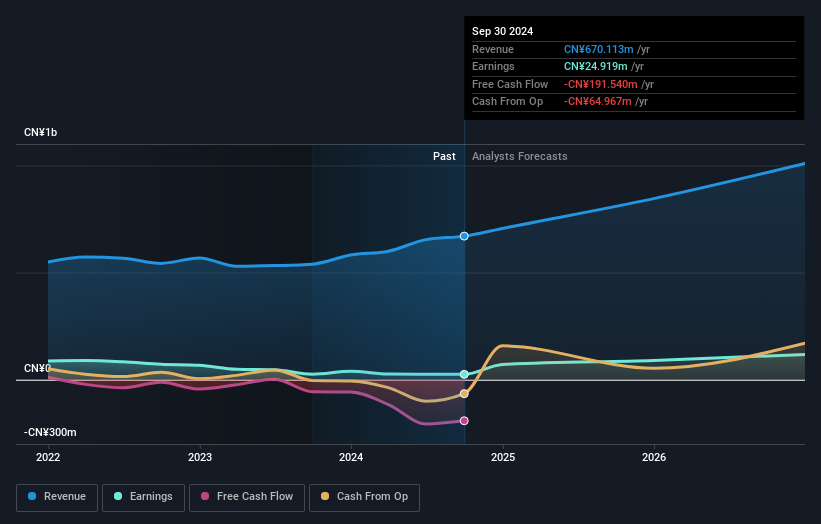- China
- /
- Semiconductors
- /
- SHSE:688170
Retail investors are Suzhou Delphi Laser Co., Ltd.'s (SHSE:688170) biggest owners and were hit after market cap dropped CN¥260m

Key Insights
- Significant control over Suzhou Delphi Laser by retail investors implies that the general public has more power to influence management and governance-related decisions
- The top 7 shareholders own 51% of the company
- 28% of Suzhou Delphi Laser is held by insiders
Every investor in Suzhou Delphi Laser Co., Ltd. (SHSE:688170) should be aware of the most powerful shareholder groups. The group holding the most number of shares in the company, around 36% to be precise, is retail investors. Put another way, the group faces the maximum upside potential (or downside risk).
While insiders who own 28% came under pressure after market cap dropped to CN¥2.2b last week,retail investors took the most losses.
In the chart below, we zoom in on the different ownership groups of Suzhou Delphi Laser.
See our latest analysis for Suzhou Delphi Laser

What Does The Institutional Ownership Tell Us About Suzhou Delphi Laser?
Institutional investors commonly compare their own returns to the returns of a commonly followed index. So they generally do consider buying larger companies that are included in the relevant benchmark index.
Suzhou Delphi Laser already has institutions on the share registry. Indeed, they own a respectable stake in the company. This can indicate that the company has a certain degree of credibility in the investment community. However, it is best to be wary of relying on the supposed validation that comes with institutional investors. They too, get it wrong sometimes. If multiple institutions change their view on a stock at the same time, you could see the share price drop fast. It's therefore worth looking at Suzhou Delphi Laser's earnings history below. Of course, the future is what really matters.

Hedge funds don't have many shares in Suzhou Delphi Laser. With a 23% stake, CEO Yuxing Zhao is the largest shareholder. In comparison, the second and third largest shareholders hold about 11% and 5.1% of the stock. Interestingly, the third-largest shareholder, Yihao Chen is also a Member of the Board of Directors, again, indicating strong insider ownership amongst the company's top shareholders.
We did some more digging and found that 7 of the top shareholders account for roughly 51% of the register, implying that along with larger shareholders, there are a few smaller shareholders, thereby balancing out each others interests somewhat.
Researching institutional ownership is a good way to gauge and filter a stock's expected performance. The same can be achieved by studying analyst sentiments. There is some analyst coverage of the stock, but it could still become more well known, with time.
Insider Ownership Of Suzhou Delphi Laser
While the precise definition of an insider can be subjective, almost everyone considers board members to be insiders. Management ultimately answers to the board. However, it is not uncommon for managers to be executive board members, especially if they are a founder or the CEO.
Most consider insider ownership a positive because it can indicate the board is well aligned with other shareholders. However, on some occasions too much power is concentrated within this group.
Our information suggests that insiders maintain a significant holding in Suzhou Delphi Laser Co., Ltd.. It has a market capitalization of just CN¥2.2b, and insiders have CN¥615m worth of shares in their own names. It is great to see insiders so invested in the business. It might be worth checking if those insiders have been buying recently.
General Public Ownership
The general public-- including retail investors -- own 36% stake in the company, and hence can't easily be ignored. This size of ownership, while considerable, may not be enough to change company policy if the decision is not in sync with other large shareholders.
Private Equity Ownership
With an ownership of 11%, private equity firms are in a position to play a role in shaping corporate strategy with a focus on value creation. Sometimes we see private equity stick around for the long term, but generally speaking they have a shorter investment horizon and -- as the name suggests -- don't invest in public companies much. After some time they may look to sell and redeploy capital elsewhere.
Private Company Ownership
Our data indicates that Private Companies hold 12%, of the company's shares. It's hard to draw any conclusions from this fact alone, so its worth looking into who owns those private companies. Sometimes insiders or other related parties have an interest in shares in a public company through a separate private company.
Next Steps:
While it is well worth considering the different groups that own a company, there are other factors that are even more important. To that end, you should be aware of the 2 warning signs we've spotted with Suzhou Delphi Laser .
Ultimately the future is most important. You can access this free report on analyst forecasts for the company.
NB: Figures in this article are calculated using data from the last twelve months, which refer to the 12-month period ending on the last date of the month the financial statement is dated. This may not be consistent with full year annual report figures.
New: Manage All Your Stock Portfolios in One Place
We've created the ultimate portfolio companion for stock investors, and it's free.
• Connect an unlimited number of Portfolios and see your total in one currency
• Be alerted to new Warning Signs or Risks via email or mobile
• Track the Fair Value of your stocks
Have feedback on this article? Concerned about the content? Get in touch with us directly. Alternatively, email editorial-team (at) simplywallst.com.
This article by Simply Wall St is general in nature. We provide commentary based on historical data and analyst forecasts only using an unbiased methodology and our articles are not intended to be financial advice. It does not constitute a recommendation to buy or sell any stock, and does not take account of your objectives, or your financial situation. We aim to bring you long-term focused analysis driven by fundamental data. Note that our analysis may not factor in the latest price-sensitive company announcements or qualitative material. Simply Wall St has no position in any stocks mentioned.
About SHSE:688170
Suzhou Delphi Laser
Engages in the research and development, manufacture, and sale of precision laser processing equipment and lasers in China and internationally.
Excellent balance sheet with reasonable growth potential.


